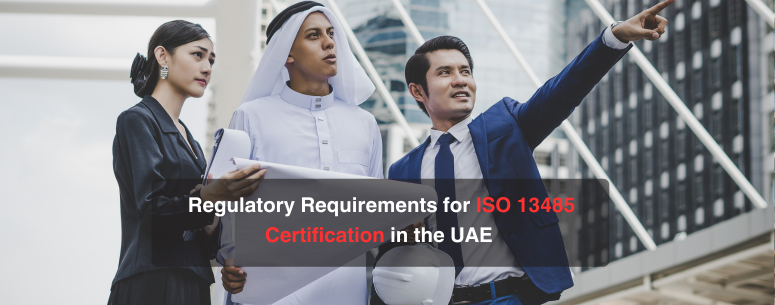
ISO 13485 certification is a vital aspect of ensuring quality and safety in the medical device industry. In the UAE, regulatory bodies play a crucial role in overseeing compliance and maintaining high standards. This blog provides an overview of the local regulatory bodies involved in ISO 13485 certification and details the specific regulations and laws that companies must comply with to achieve and maintain certification.
Overview of Local Regulatory Bodies
- 1. Ministry of Health and Prevention (MOHAP)
- MOHAP is the primary regulatory authority responsible for healthcare regulation in the UAE. It oversees the approval and registration of medical devices, ensuring they meet safety and efficacy standards.
- Role in ISO 13485 Certification: MOHAP requires medical device manufacturers to demonstrate compliance with international standards, including ISO 13485, as part of the registration process.
- 2. Dubai Health Authority (DHA)
- The DHA regulates healthcare services and facilities in the Emirate of Dubai. It sets standards for medical devices used within its jurisdiction and ensures compliance with safety regulations.
- Role in ISO 13485 Certification: Companies operating in Dubai must adhere to DHA regulations, which include meeting ISO 13485 standards for quality management systems.
- 3. Abu Dhabi Department of Health (DOH)
- The DOH oversees the healthcare sector in Abu Dhabi, ensuring the quality and safety of medical devices and services. It establishes guidelines and regulations for the approval and monitoring of medical devices.
- Role in ISO 13485 Certification: The DOH mandates compliance with ISO 13485 as part of its regulatory framework, ensuring that medical device manufacturers maintain high-quality standards.
- 4. Emirates Authority for Standardization and Metrology (ESMA)
- ESMA is responsible for developing and enforcing national standards across various sectors, including healthcare. It collaborates with international bodies to align UAE standards with global best practices.
- Role in ISO 13485 Certification: ESMA supports the implementation of ISO 13485 standards in the UAE, providing guidance and ensuring compliance with national regulations.
Compliance with UAE-Specific Regulations and Laws
- 1. Medical Device Registration
- All medical devices must be registered with the relevant regulatory body (MOHAP, DHA, or DOH) before they can be marketed and sold in the UAE.
- Compliance Requirement: Manufacturers must provide evidence of ISO 13485 certification as part of the registration process, demonstrating their commitment to quality management and regulatory compliance.
- 2. Conformity Assessment
- Conformity assessment involves evaluating whether a medical device meets the required standards and regulations. This process includes testing, inspection, and certification.
- Compliance Requirement: ISO 13485 certification is often a prerequisite for conformity assessment, ensuring that the manufacturer’s quality management system is robust and effective.
- 3. Post-Market Surveillance
- Regulatory bodies in the UAE require manufacturers to conduct post-market surveillance to monitor the performance and safety of medical devices after they have been placed on the market.
- Compliance Requirement: An ISO 13485-certified quality management system helps manufacturers establish effective post-market surveillance procedures, ensuring continuous compliance with regulatory requirements.
- 4. Import and Distribution Regulations
- Companies involved in the import and distribution of medical devices must comply with specific regulations to ensure that products meet safety and quality standards.
- Compliance Requirement: ISO 13485 certification provides a framework for maintaining quality throughout the supply chain, from manufacturing to distribution, ensuring compliance with import regulations.
- 5. Labeling and Documentation
- Medical devices must be appropriately labeled and accompanied by documentation that provides essential information about the product, including usage instructions, safety warnings, and regulatory compliance.
- Compliance Requirement: ISO 13485 certification ensures that manufacturers have procedures in place to create accurate and compliant labeling and documentation.
- 6. Audits and Inspections
- Regulatory bodies conduct regular audits and inspections of manufacturing facilities to ensure ongoing compliance with quality and safety standards.
- Compliance Requirement: Maintaining ISO 13485 certification involves regular internal audits and readiness for external inspections, demonstrating a commitment to continuous improvement and regulatory compliance.
Conclusion
Achieving ISO 13485 certification in the UAE requires a thorough understanding of the local regulatory landscape and compliance with specific regulations and laws. The Ministry of Health and Prevention, Dubai Health Authority, Abu Dhabi Department of Health, and Emirates Authority for Standardization and Metrology play pivotal roles in ensuring that medical device manufacturers adhere to high standards of quality and safety. By aligning their quality management systems with ISO 13485 standards and meeting UAE-specific regulatory requirements, companies can ensure the safety and efficacy of their medical devices, thereby gaining a competitive edge in the growing UAE healthcare market.
ISO CERTIFICATIONS
- ISO 9001 Certification
- ISO 14001 Certification
- ISO 10001 Certification
- ISO 10002 Certification
- ISO 10004 Certification
- ISO 13485 Certification
- ISO 18295 Certification
- ISO 20000 Certification
- ISO 20121 Certification
- ISO 21001 Certification
- ISO 22000 Certification
- ISO 22301 Certification
- ISO 22716 Certification
- ISO 27001 Certification
- ISO 27017 Certification
- ISO 27018 Certification
- ISO 27701 Certification
- ISO 28000 Certification
- ISO 29001 Certification
- ISO 37001 Certification
- ISO 37301 Certification
- ISO 38500 Certification
- ISO 39001 Certification
- ISO 45001 Certification
- ISO 50001 Certification
- GMP Certification
